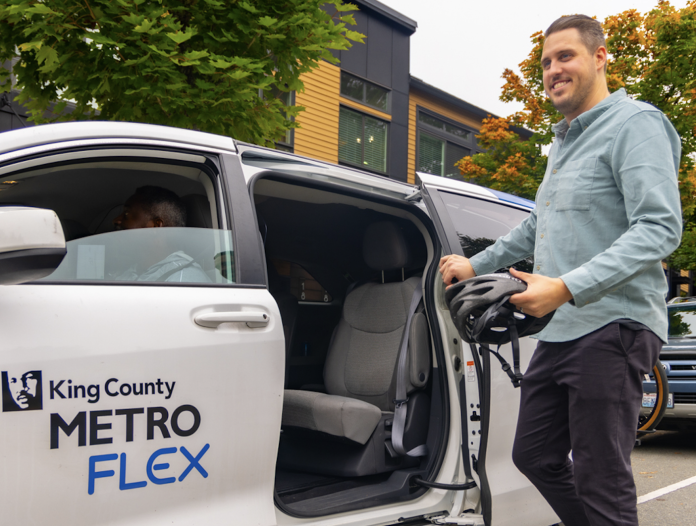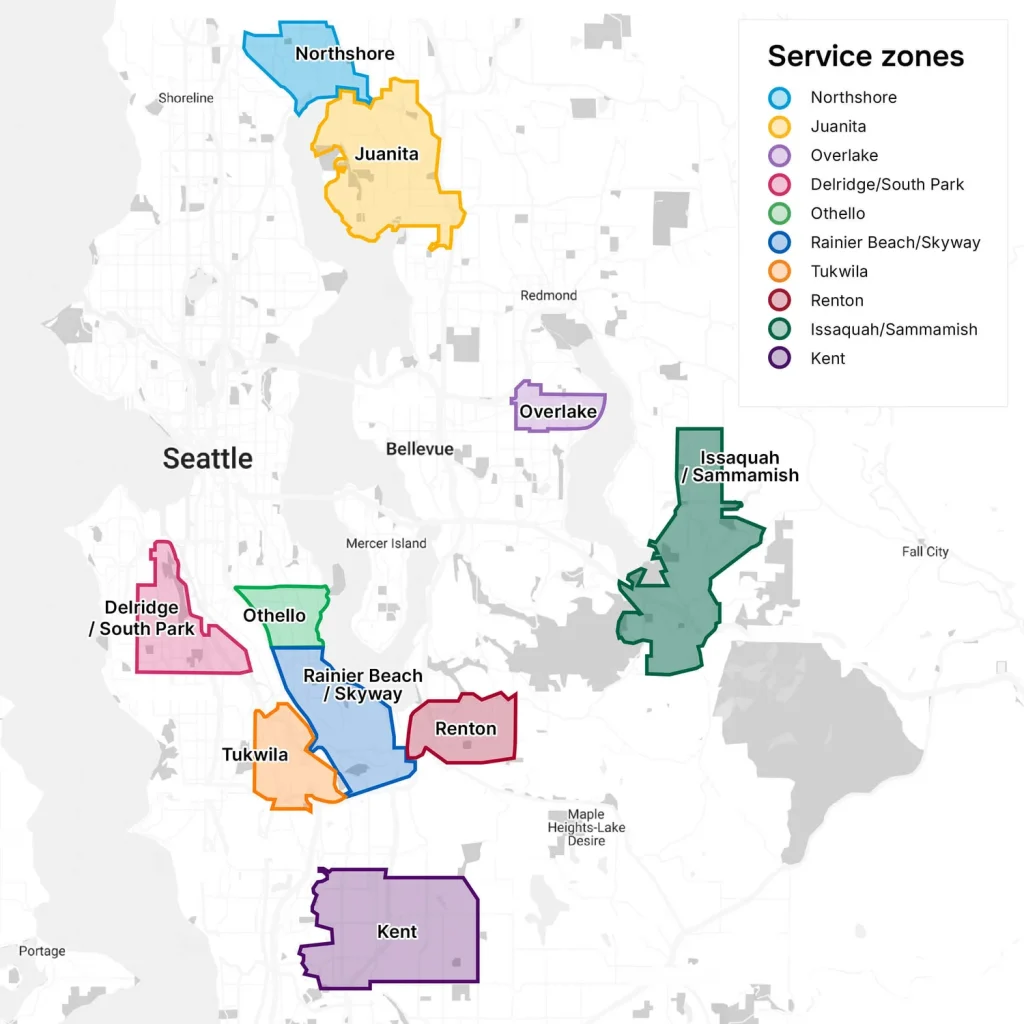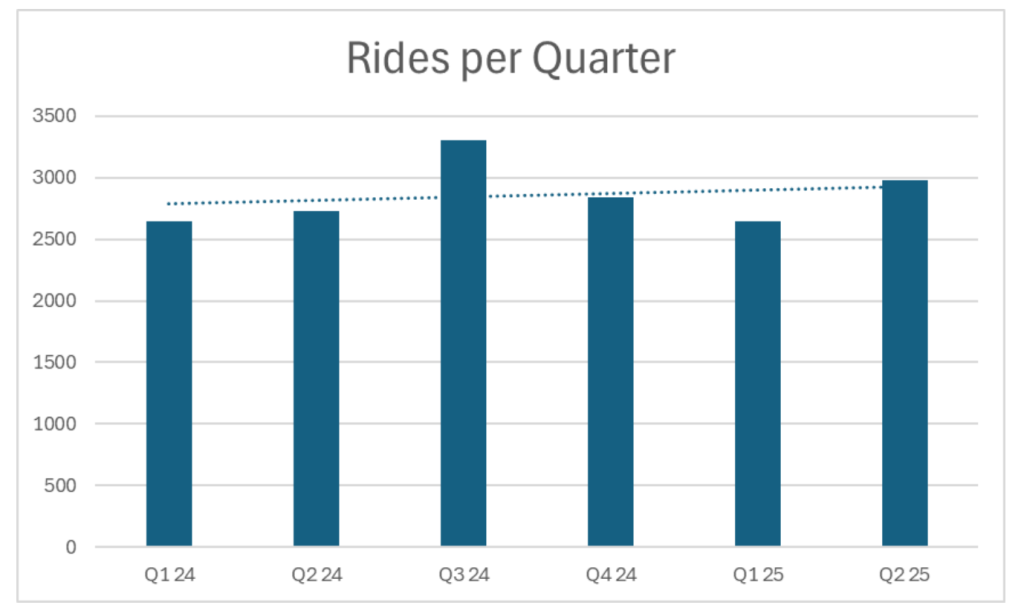
Issaquah Mayor Mary Lou Pauly is recommending that the city not renew its contract with King County Metro to operate its Metro Flex shuttle within most Issaquah neighborhoods, shutting off on-demand transit access at the end of this year. That proposal met a skeptical city council Monday night, with councilmembers not ready to pull the plug on Metro Flex.
The service has been operating throughout Central Issaquah, Squak Mountain, Talus and a slice of the Issaquah Highlands since late 2023.
Around 40 people use the on-demand Metro Flex service every weekday in Issaquah, a usage rate that is lower than other Metro Flex service areas like Tukwila or Seattle’s Rainier Valley, but ahead of Juanita in Kirkland and the North Shore area around Kenmore and Lake Forest Park. At a cost of around $41 per ride, Issaquah has been subsidizing around half of that average trip cost using City dollars, but Mayor Pauly proposes to divert that funding to other policy priorities.
Without a renewal of the contract, Metro Flex’s service area would likely shrink to what it was in early 2023, only covering parts of Sammamish and a small sliver of Issaquah.

Pauly is set to leave office at the end of the year. As such, a decision to pull the plug now could limit the options that future leaders would have to provide supplemental transit service in Issaquah — stepping away from a city goal to provide transit access to areas like Talus and Squak that have no other access to transit service.
Instead many Councilmembers expressed interest in keeping the program rolling, with the goal of more clearly moving into a next phase. Such a move may still ultimately sunset Metro Flex service, but on a more gradual timeline.
Issaquah’s 2026 budget already includes $200,000 to continue subsidizing Metro Flex, which means the City would only need to find an additional $58,000 to continue service for another year. The City’s cost for the second year of the two-year contract in 2027 would be another $258,000, but that contract could be terminated early with six months’ notice. Another wrinkle? The City already eliminated the transportation planner who had been overseeing the Metro Flex program.
Ahead of the discussion on how to proceed, the city council looked at data showing how Issaquah residents are using the Metro Flex. Issaquah Transit Center, Issaquah High School, and Issaquah Commons shopping center jump off the map as the highest-requested pickup locations. Also ranking prominently was the Rose Crest Apartments in Talus, an affordable housing complex quite a significant walking distance from the nearest Metro bus route.

Councilmembers also expressed frustration with Mayor Pauly’s administration for bringing this issue up now, with very little time to discuss alternative options for providing basic mobility to those in the city who need it most.
“I really don’t appreciate how this was brought to us, three months before the end of the contract,” Councilmember Kelly Jiang said. “We knew that this was coming up when we passed the budget a year ago. So, we could have spent this time thinking about if our budget for these types of transportation solutions is $200,000 what could we do with that $200,000 if not Metro Flex?”
With a partner in King County Metro willing to cover half of the cost of rides, Issaquah would be unlikely to find a better way to offer this type of service. In the past, the City had looked at creating its own type of shuttle service, which would almost certainly cost the city more. One idea that did come up is an e-bike lending library that residents could use to make last mile connections. But any alternative would take time to set up.
“If we just look at 3,000 passenger rides [per quarter], that equals about 800 people from equity priority areas who are taking Metro flex, and may not have an option,” Councilmember Barbara de Michele said. “What bothers me about canceling Metro Flex is that we really don’t have any viable options to replace it.”

Council President Lindsay Walsh, currently vying to become the city’s next mayor, suggested that the city could also adjust the Metro Flex service area, subtracting out the Squak area where few riders are using the service, and adding in more of the Issaquah Highlands, a denser neighborhood with more destinations like parks and schools. Walsh faces a tough fight against Mark Mullet, a moderate former State Senator and former Issaquah Councilmember.
“I’m hesitant to break off from a contract that we have that is being utilized for 11,000 rides per year without evaluating where our values are and where we would go with this, especially given we can just do a six-month outage on something like this,” Walsh said. “If we were being given the information or evaluating other ways that we might utilize our budget, I think that’s a very valid conversation to have. Right now, we have a lack of information in one area, and we have a set of utilization in the other [area]. So, we’re kind of evaluating a somewhat known against a question mark, and I think that’s a difficult position to put us in.”
Issaquah City Manager Wally Bobkiewicz made it clear that the Mayor’s recommendation was to not renew the contract, and that if the city council decided to overrule that it would be going it alone. That could make adjustments to the program to actually make it succeed harder to implement on the council level.
“Mayor Pauly, this recommendation is really coming from her. She’s very concerned about the cost. She’s very concerned about future issues,” Bobkiewicz said. “The mayor enters into the contract. The mayor is not, at this point, willing to do that.”
With a majority of the Issaquah council pushing to renew the contract so they can take a more intentional look at how the program is working early next year, that could set up a tussle between councilmembers and the city’s outgoing mayor over the coming weeks.
Ryan Packer has been writing for The Urbanist since 2015, and currently reports full-time as Contributing Editor. Their beats are transportation, land use, public space, traffic safety, and obscure community meetings. Packer has also reported for other regional outlets including BikePortland, Seattle Met, and PubliCola. They live in the Capitol Hill neighborhood of Seattle.

